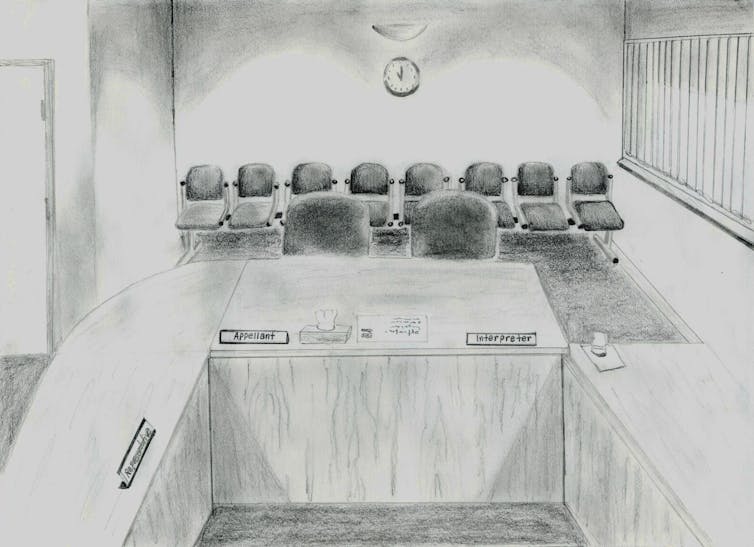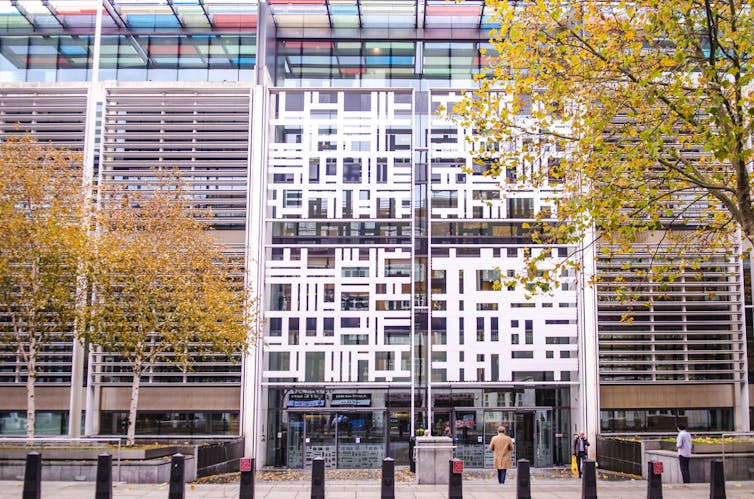 An asylum appeal court: a judge’s view. Rebecca Rotter, CC BY-NC
An asylum appeal court: a judge’s view. Rebecca Rotter, CC BY-NC
Jennifer Allsopp, University of Oxford; Andrew Burridge, University of Exeter; Melanie Griffiths, University of Bristol; Nick Gill, University of Exeter, and Rebecca Rotter, University of Edinburgh
New evidence suggests that where an asylum seeker ends up in Britain could have a significant impact on the likelihood that they are granted refugee protection, regardless of whether their life is in danger. From an Afghan child fleeing forced recruitment into the Taliban, to a Ugandan lesbian fleeing police violence, geography seems to be affecting the justice process that asylum seekers often depend upon for their safety and their lives.
Freedom of Information data obtained by the BBC’s Victoria Derbyshire programme pointed towards the legal “lottery” asylum seekers face depending on where their appeal is heard. The new data related to 36,000 asylum appeals heard between January 2013 and September 2016. It showed asylum seekers were almost twice as likely to win an appeal at Taylor House in Clerkenwell, London (47%) than Belfast (24%) and significantly more likely than in Glasgow (28%).
As part of a recent research project, we observed over 400 asylum appeals and saw firsthand the inconsistencies in the system.
Asylum appeals are a chance for people whose application for refugee status has been rejected by an official in the Home Office to argue before a judge that their case should be reconsidered, or be granted further leave to remain on human rights grounds. The overall success rate on appeal in 2016 was over 40%, meaning that more than two fifths of the government’s initial refusal decisions that year were found to be wrong – an astonishingly high figure within the strict terms set out in British law.
There are various reasons why London courts might have higher appeal success rates. London offers some of the best quality immigration law firms in the country and has the densest network of such firms. Often London lawyers are not keen to make the long journeys to courts outside London for hearing that can take all day.
The problem is that asylum seekers are not usually offered a choice on where they are housed and if they refuse to move, they could become homeless. For many poor asylum seekers, this means moving away from London, thereby often foregoing their access to the widest network of legal firms in the country. The UK’s politics of austerity have created new legal aid deserts in many areas outside of London. These disparities in success rates are therefore particularly worrying for poorer asylum seekers. Especially as the chances of winning an asylum claim as an unrepresented appellant are painfully low.
Read more: Legal advice for asylum seekers disappearing due to legal aid cuts
It’s hard to convey the gravity of the appeal hearing from the perspective of those whose lives may depend on it. An unrepresented male asylum seeker from Gambia, interviewed in Cardiff in February 2014, told us:
This is stressful. I am alone, I have no family, so it is me alone fighting for my life. The Home Office solicitor was saying I was [lying]. But it is all on the judge – let him decide now. I’ve got no solicitor, no one to speak to, so I go and speak [for myself], that’s what I do.
For many the process of the appeal is re-traumatising. In the course of our research we observed appellants sobbing and retching in the toilets. One woman counted rosary beads, another fainted.

Jennifer Allsopp, Author provided
Inconsistencies
Many asylum seekers meet their representative just minutes before the hearing. The shortage of consultation rooms means it is common in busy centres to observe asylum seekers recounting traumatic incidents of persecution to their lawyers while squatted in a public, crowded corridor next to a vending machine, sometimes in tears.
The quality of interpreting is also variable, and often also worse in centres outside major urban centres. In one case we observed, an appellant revealed that the interpreter had misinterpreted “I escaped” with “I was scared”. Because of a well-documented “culture of disbelief” towards asylum applicants on the part of decision-makers, even small mis-translations can put people at risk of being refused asylum on the grounds of poor credibility.
A lack of consistent process from judges both within and across the different centres is particularly concerning. In a recent study we found that female immigration judges tended to be more helpful towards appellants on the day of the hearing in comparison to male judges. Female judges more frequently explained the nature of the proceedings to appellants and reassured them that they could ask if they did not understand anything. Overall, the judges – both men and women – tended to provide less guidance to female appellants. We did observe some judges going beyond the call of duty to make appellants feel comfortable.
When some judges follow best practice and others do not, disparities are compounded. This level of discretion is inappropriate. This could be tackled with measures as simple as developing video introductions to the procedure in a range of languages. Individual judges are currently largely left to their own devices during the hearings, with no audio or video recording of the hearing to hold them to account, and members of the public are rarely present to scrutinise what happens. One judge told us, asylum tribunals are “not the Old Bailey, we don’t need to cross our ‘i’s’ and dot our ‘t’s’”.
Without a proper explanation of the process at the start, many appellants were confused about what was happening in their hearings. An asylum seeker from Iraq told us that he was desperate for the toilet but unaware that he could ask for a break. In the two-hour appeal, he had recounted watching his brother’s murder and was twice reduced to tears. Another appellant had thought that their whole hearing was a practice.

An unfair situation
Fatigue, repetition and scheduling are important elements that shape the judges’ behaviour towards the appellants. We found that the helpfulness of judges declined throughout the week. One judge who came to speak to us after a hearing confessed that the “compassion fatigue” of observing multiple hearings per day can be difficult to manage.
Although most judges were attentive to and respectful of appellants, on several occasions, the fatigue manifested itself. We overheard judges requesting legal representatives rush hearings – in one case because they were going on holiday. One judge repeatedly nodded off. Another looked on when a Home Office representative repeatedly swore at the appellant.
Representatives for the Home Office in the hearings we watched often made it difficult for appellants to put their full case forward by using aggressive styles of questioning or letting simple misunderstandings by the appellant go uncorrected. One Home Office presenting officer told us that they used this as a deliberate tactic to make the appellants appear evasive. She explained that in her long career she had never met an asylum seeker she believed, commenting that, “they all lie”. Other Home Office representatives were much more sensitive in their questioning style which allowed the appellants to recount their stories with greater ease.
These newly documented inconsistencies in success rates across tribunals and in procedure undermine faith in the fairness of British law. Failure to do right by those in fear for their lives is shameful and will only result in ever higher appeal rates and a waste of taxpayers’ money.
Jennifer Allsopp, PhD Candidate and Researcher in Migration Studies, University of Oxford; Andrew Burridge, Associate Research Fellow at the College of Life and Environmental Sciences, University of Exeter; Melanie Griffiths, Senior Research Associate , University of Bristol; Nick Gill, Professor in Human Geography, University of Exeter, and Rebecca Rotter, Research Fellow, Social Anthropology, University of Edinburgh
![]() This article was originally published on The Conversation. Read the original article.
This article was originally published on The Conversation. Read the original article.
